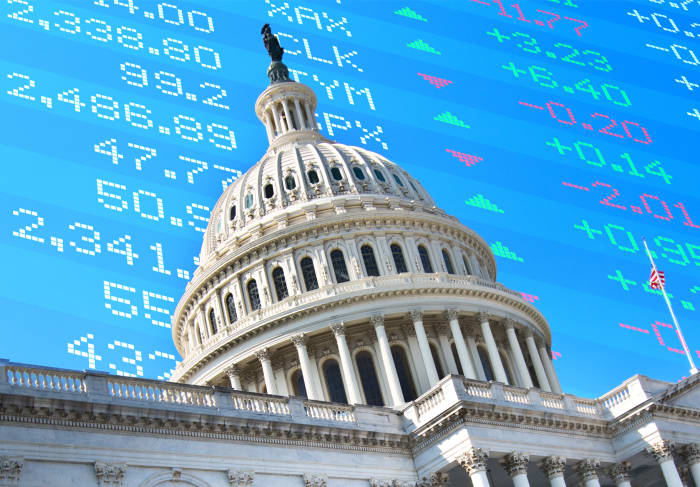This post was originally published on this site
Shares of Meta Platforms Inc.
FB,
— Facebook’s parent — fell 26% on Feb. 3, as investors reacted to a lower-than-expected fourth-quarter profit and the company’s own revenue estimates.
Meta attributed its reduced outlook for advertising sales in part to Apple Inc.’s change in privacy policies for users of iPhones and other devices. But Meta also said in its earnings release that it had been “hearing from advertisers that macroeconomic challenges like cost inflation and supply chain disruptions are impacting advertiser budgets.”
In his Revolution Investing column, Cody Willard (a long-term Meta/Facebook shareholder) wrote that the above comment from Meta was a warning of a possible slowing of economic growth, because of the scale of the company’s advertising business — roughly $115 billion in 2021 — and the fact that it serves customers of all sizes. Still, he expects Meta to be a long-term winner as it builds out its “metaverse.”
More coverage of Facebook’s results, stock plunge and reaction:
Amazon’s holiday-quarter earnings euphoria is worth a second look
The market’s reaction to Amazon.com Inc.’s
AMZN,
quarterly earnings report was completely different from what happened with Meta/Facebook. Amazon’s stock was up as much as 12% in morning trading on Feb. 4 on the heels of a fourth-quarter profit of $14.3 billion, or $27.75 a share, that blew past the consensus estimate among analysts polled by FactSet of $3.61. But Amazon said it booked $11.8 billion in pretax unrealized gains on its investment in Rivian Automotive Inc.
RIVN,
which went public in November.
Accounting rules put in place in 2018 force companies to reflect unrealized gains or losses on stock investments in their net income. Amazon said its operating income for the fourth quarter declined to $3.5 billion from $6.9 billion a year earlier.
To be sure, Amazon has traditionally focused on plowing its cash flow back into the company to increase sales and expand into new areas, rather than showing high profits.
Its Amazon Web Services unit increased its operating income to $5.3 billion in the fourth quarter from $3.6 billion a year earlier. So AWS provided operating earnings exceeding that for all of Amazon, even though its fourth-quarter sales of $17.8 billion was 13% of Amazon’s total sales. Sales at AWS for the fourth quarter were up 40% from a year earlier, while Amazon’s total sales were up 9%.
More coverage of Amazon:
Which members of Congress are the biggest stock traders?

MarketWatch photo illustration/iStockphoto
There are several bills being considered in the Senate and House of Representatives that would limit stock trading by members of Congress and maybe their families. Victor Reklaitis describes the various measures and lists the lawmakers that made the most stock trades last year.
More: These U.S. lawmakers rank as the biggest traders of hot stocks like Apple, Tesla and GameStop
Plus: Congress’s crypto traders: The U.S. lawmakers who buy and sell digital currencies
The best job in America?
You have probably seen similar headlines, but this one has an average salary of $145,000, over 14,000 openings and ranks high for job satisfaction, according to a Glassdoor poll.
Plus: ‘Crazy’ swings in Friday’s U.S. job report tells us two things
Working through a retirement/debt scenario

MarketWatch photo illustration/iStockphoto
Alessandra Malito writes the Help Me Retire column. This week she helps a woman who is 63 and has a retirement account, but is having difficulty deciding whether or not to withdraw from her investment account to pay down debt.
Busting some myths about stock splits
Traditionally, companies split their shares to keep prices relatively low and presumably attract more investors. The idea is that many investors will shy away from a stock with a very high price, but might jump in after a split, even though the split itself makes no fundamental change to a company or its stock’s fundamentals.
In the age of computerized trading and with decades having passed since investors were required to buy shares in “round lots” of 100, many thriving companies have resisted slitting their shares, even when prices rise into the thousands. But Alphabet Inc.
GOOG,
GOOGL,
plans a 20-for-one split on July 15, for shareholders of record as of July 1, subject to a shareholder approval vote.
This raises the question of whether or not investors should incorporate stock splits into their decision-making. Mark Hulbert dispels two myths about stock splits.
Playing it safer online

Getty Images
Alphabet — Google’s holding company — thrilled investors early this week when it reported a 32% increase in fourth-quarter revenue from a year earlier, with earnings per share rising 38%.
One possible problem for Google is that it may have to change the way it collects users’ private information; it is facing several lawsuits over data privacy.
Jurica Dujmovic provides a simple step-by-step guide to changing your Google settings to reduce the company’s ability to track your location of internet activity.
Starbucks — four bucks

You may pay even more than $4 soon for a latte at Starbucks.
Getty Images
Starbucks Corp.
SBUX,
reported a 12% increase in sales for its first fiscal quarter ended Jan. 2 from a year earlier, however, its comparable-store sales were down 3% and its earnings came in below analysts’ expectations. The company’s CEO Kevin Johnson cited inflationary pressures and said several more price increases were likely this year.
Read on: Goldman Sachs downgrades Starbucks as cost pressures weigh on results
It’s tax season — it’s IRS backlog season

Getty Images/iStockphoto
Some people fear the Internal Revenue Service, but it’s important to remember that taxpayers are customers of the agency. One sore point has been the IRS’s practice of sending out notices to taxpayers that they have tax balances due, when the agency hasn’t yet filed the returns the taxpayers have filed.
The IRS will suspend these notices, as Andrew Keshner reports.
Beverly Moran looks at ways to reduce the complexity and cost of tax-return filing, and lists some barriers to reform.
Why did Intel choose Ohio for its new $20 billion factory?
States and cities compete to have large companies build factories locally. But the reason a company selects a particular area may not only be the tax breaks it receives, as Michael J. Hicks explains.
Alaska’s $80 billion oil fund beats its benchmark — and the boss is fired
Cue an investigation by the state senate. “To me, it’s the equivalent of trading Michael Jordan after you’ve won five NBA championships,” says one state senator. The fund’s trustees release a 300-page personnel file and say “move on.”
Want more from MarketWatch? Sign up for this and other newsletters, and get the latest news, personal finance and investing advice.


